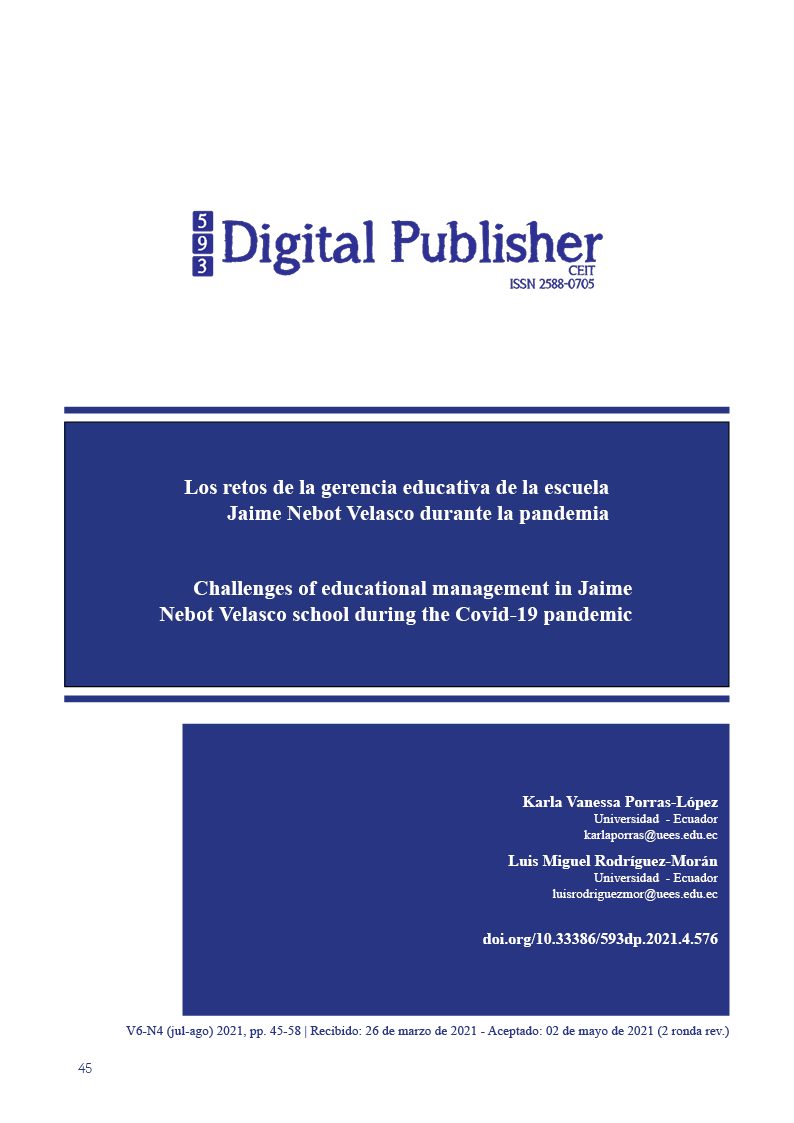Challenges of educational management in Jaime Nebot Velasco school during the Covid-19 pandemic
Main Article Content
Abstract
The sanitary crisis by the covid-19 has made a strong impact directly in the educational institutions of all the cities of the country, affecting in a direct way students, ministries, educational centers, teachers and directors, therefore, the closing of educational centers as part of the protocol to avoid the virus propagation has all the students without attending the educational centers; For this reason educational management has taken an important role today, because they must face the challenges through the implementation of strategies that involve helping all participants in the community, in order to provide teaching-learning with or without digital technologies.
Education has been transformed by the pandemic; understanding and addressing these facts is a challenge for every member of the educational community. The authors, in this investigation have highlighted the importance of the work of the educational manager in the Jaime Nebot School in time of resilience, since the strategies that will be implemented will be the main gear that will allow a correct operation, of the educational environment. The main objective is to establish strategies that contribute to the strengthening of institutional communication in times of pandemic. This has been validated through qualitative research using the method of direct observation, so it will be possible to analyze the decisions made by the authorities of the campus, and through these to strengthen the organizational culture and guidelines that have been implemented in the institution. In conclusion, this research work shows that a good educational management will be carried out through strategies where it is determined that the realization of a collective participation, will help to face and solve difficulties, thus facilitating the access to online education to all participants from a common perspective.
Downloads
Article Details

This work is licensed under a Creative Commons Attribution-NonCommercial-ShareAlike 4.0 International License.
1. Derechos de autor
Las obras que se publican en 593 Digital Publisher CEIT están sujetas a los siguientes términos:
1.1. 593 Digital Publisher CEIT, conserva los derechos patrimoniales (copyright) de las obras publicadas, favorece y permite la reutilización de las mismas bajo la licencia Licencia Creative Commons 4.0 de Reconocimiento-NoComercial-CompartirIgual 4.0, por lo cual se pueden copiar, usar, difundir, transmitir y exponer públicamente, siempre que:
1.1.a. Se cite la autoría y fuente original de su publicación (revista, editorial, URL).
1.1.b. No se usen para fines comerciales u onerosos.
1.1.c. Se mencione la existencia y especificaciones de esta licencia de uso.
References
Cañas, D. C., & Hernández, J. (2019). Comunicación asertiva en profesores: diagnóstico y propuesta educativa. Praxis & Saber, 10(24), 143-165. doi:https://doi.org/10.19053/22160159.v10.n25.2019.8936
Carriego , C. (noviembre de 2016). Gestionar una escuela comprometida con las demandas de su tiempo. Revista Paraguaya de Educación(6), 29-35. Obtenido de https://www.mec.gov.py/cms_v2/adjuntos/14509?1500381087
Chacón , L. (2014). Gestión educativa del siglo XXI: bajo el paradigma emergente de la complejidad. Omnia, 20(2), 150-161. Obtenido de https://www.redalyc.org/articulo.oa?id=73735396006
Corrales Pérez, A., Quijano León, N., & Góngora Coronado, E. (2017). Empatía, comunicación asertiva y seguimiento de normas. Un programa para desarrollar habilidades para la vida. Enseñanza e Investigación en Psicología, 22(1), 58-65. Obtenido de https://www.redalyc.org/pdf/292/29251161005.pdf
Del Prete, A., & Cabero Almenara, J. (2019). Las plataformas de formación virtual: algunas variables que determinan su utilización. Apertura (Guadalajara, Jal.), 11(2), 138-153. doi:https://doi.org/10.32870/ap.v11n2.1521
Escandell Montiel, D. (diciembre de 2017). Alfabetismo digital en la enseñanza de segundas lenguas: espacios para una educación adaptada a las necesidades comunicativas de nuestra época. Doblele, 3(3), 17-30. doi:https://doi.org/10.5565/rev/doblele.27
Fernández Enguita, M. (31 de marzo de 2020). Una pandemia imprevisible ha traído la brecha previsible. Obtenido de Cuaderno de campo: https://blog.enguita.info/2020/03/una-pandemia-imprevisible-ha-traido-la.html
Flores Orozco, S. (18 de marzo de 2015). Proceso administrativo y gestión empresarial en Coproabas, Jinotega. Obtenido de Repositorio UNAN-Managua: https://repositorio.unan.edu.ni/1800/1/5330.pdf
García Luna, B. (2016). Evaluación de la gestión educativa. Gestiopolis. Obtenido de https://www.gestiopolis.com/evaluacion-la-gestion-educativa-reflexiones/
García Peñalvo, F. (2020). Evaluación del aprendizaje en entornos virtuales y remotos. II Ciclo de Capacitaciones por una calidad educativa de nuestro país. doi:10.5281/zenodo.3903755
García, R., Hernández, M., Díaz Uribe, H., & Morales Vásquez, M. (2017). Ambientes Virtuales de Aprendizaje: un análisis comparado de un Centro de Posgrado. TECTZAPIC Revista de divulgación, 3(1). Obtenido de https://www.eumed.net/rev/tectzapic/2017/01/ambiente-virtual-aprendizaje.html
Graffe, G. (2002). Gestión educativa para la transformación de la escuela. Revista de Pedagogía, 23(68), 495-517. Obtenido de http://ve.scielo.org/scielo.php?script=sci_arttext&pid=S0798-97922002000300007&lng=es&tlng=es
Hiraldo Trejo, R. (2013). Uso de loos entornos virtuales de aprendizaje en la educación a distancia. Edutec. Obtenido de https://www.uned.ac.cr/academica/edutec/memoria/ponencias/hiraldo_162.pdf
Hodges , C., Moore, S., Lockee, B., & Bond, A. (2020). The Difference Between Emergency Remote Teaching and Online Learning. Educause Review. Obtenido de https://er.educause.edu/articles/2020/3/the-difference-between-emergency-remote-teaching-and-online-learning
Llorens, F. (29 de abril de 2020). Docencia de emergencia: cómo cambiar el motor en pleno vuelo. Obtenido de El blog de Studia XXI: https://www.universidadsi.es/docencia-de-emergencia-como-cambiar-el-motor-en-pleno-vuelo/
Merchán Basabe, C. (2018). Modelamiento pedagógico de Ambientes Virtuales de Aprendizaje (AVA). Tecné, Episteme y Didaxis: TED(44), 51-70. Obtenido de http://www.scielo.org.co/scielo.php?script=sci_arttext&pid=S0121-38142018000200051&lng=en&tlng=es.
Miranda Beltrán , S. (2016). La gestión directiva: un concepto construido desde las comprensiones de los directivos docentes de las escuelas públicas bogotanas. RIDE. Revista Iberoamericana para la Investigación y el Desarrollo Educativo, 7(13), 562-589. Obtenido de http://www.scielo.org.mx/scielo.php?script=sci_arttext&pid=S2007-74672016000200562&lng=es&tlng=es.
Ospina Pineda, D. (2014). ¿Qué es un ambiente virtual de aprendizaje? Programa Integración de Tecnologías a la Docencia. Obtenido de http://aprendeenlinea.udea.edu.co/boa/contenidos.php/cee1c4c4045aded3a9cecfbcdaf9d8db/144/1/contenido/
Pérez de Maldonado, I., Maldonado Pérez, M., & Bustamante Uzcátegui, S. (2006). Clima organizacional y gerencia: inductores del cambio organizacional. Investigación y Postgrado, 21(2), 231-248. Obtenido de https://www.redalyc.org/articulo.oa?id=65821209
Pulido Capurro, V., & Olivera Carhuaz, E. (2019). Gerencia educativa: Una visión empresarial de la educación básica. Revista Científica de la UCSA, 6(3), 52-62. doi:https://dx.doi.org/10.18004/ucsa/2409-8752/2019.006.03.052-062
Rayón Parra, A., Ledesma Saucedo, R., & Escalera Escajeda, S. (2009). Ambientes virtuales de aprendizaje. Instituto Politécnico Nacional-IPN, 1-9. Obtenido de http://investigacion.ilce.edu.mx/panel_control/doc/Rayon_Parra.pdf
Reyes Ramírez, L. (2004). Los nuevos desafíos de la gerencia educativa. Educación y Educadores(7), 113-136. Obtenido de https://www.redalyc.org/pdf/834/83400709.pdf
Rico Molano, A. (2016). La gestión educativa: Hacia la optimización de la formación docente en la educación superior en Colombia. Sophia, 12(1), 55-70. Obtenido de http://www.scielo.org.co/pdf/sph/v12n1/v12n1a04.pdf
Tello, C. (2016). Gestionar la escuela en Latinoamérica. Gestión educativa, realidad y política. Revista Paraguaya de Educación(6), 15-25. Obtenido de https://www.mec.gov.py/cms_v2/adjuntos/14509?1500381087
Torres, Z. (2014). Administración estratégica. México: Grupo editorial Patria. Obtenido de https://books.google.co.ve/books?id=NNThBAAAQBAJ&printsec=frontcover&dq=administraci%C3%B3n+estrat%C3%A9gica&hl#v=onepage&q=administraci%C3%B3n%20estrat%C3%A9gica&f=false
Ugalde Villalobos, M., & Canales García, A. (2016). El liderazgo académico, comunicación asertiva y motivación. Ensayos Pedagógicos, 11(2), 45-61. Obtenido de https://www.revistas.una.ac.cr/index.php/ensayospedagogicos/article/view/9146/10671



